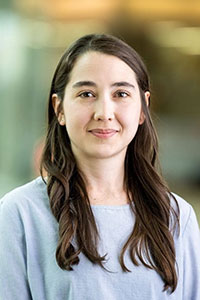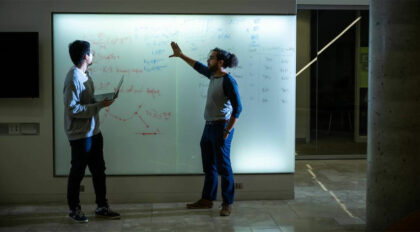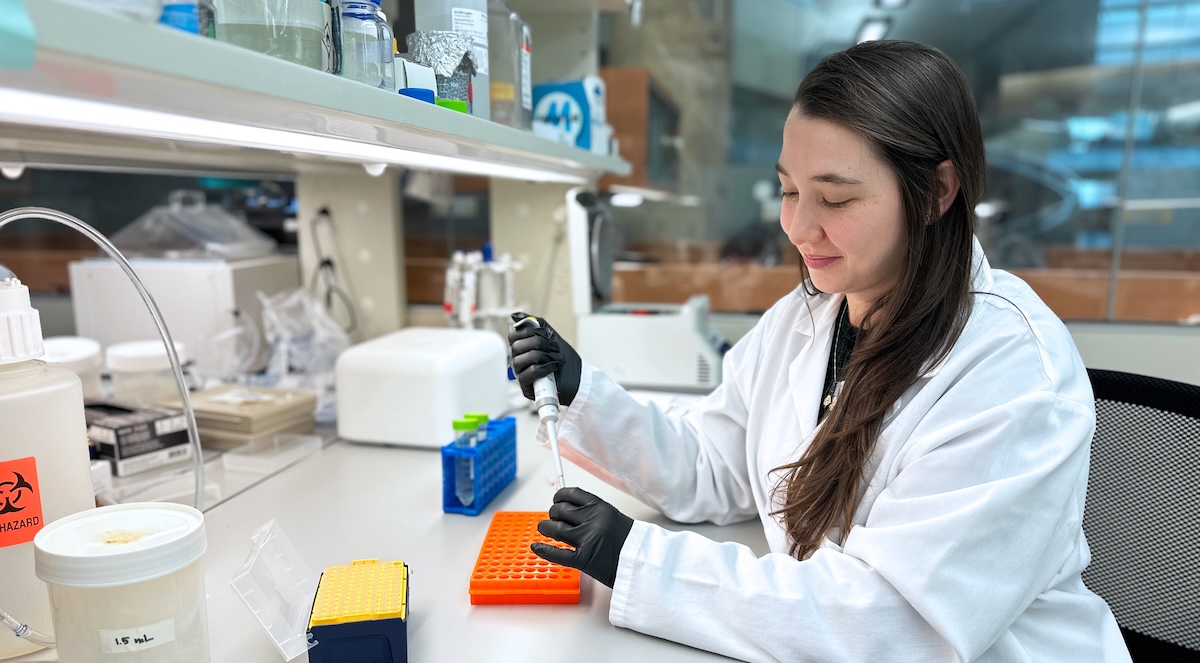Inside the fascinating world of viruses
Growing up in Medellín, Colombia, Helena Jaramillo Mesa remembers her mother’s oft-repeated admonition to “never let anyone or anything cut your wings.”
Early on, she came to believe that her altitude in life relied on constant learning, absorbing every chance to take on new challenges and absorb fresh ideas. With that as a backdrop, Jaramillo Mesa is thriving as a postdoctoral researcher in Morgridge Investigator Paul Ahlquist’s lab in the John W. and Jeanne M. Rowe Center for Research in Virology.

“I’m driven by purpose. I like waking up every day feeling that I love what I do and I’m so fortunate and privileged that my job is learning,” says Jaramillo Mesa. “I literally get paid to learn new things every day. I wouldn’t do well in an environment where I’m not stimulated all the time.”
In the Ahlquist Lab, Jaramillo Mesa studies how RNA viruses replicate by assembling specialized structures inside host cells. Understanding these processes could help unlock new strategies for developing broad-spectrum anti-viral treatments to control the viruses.
“Each virus has its own way to do it,” she says. “The major limitation we face in controlling viruses is that we’re developing one antiviral against one virus, and that is a losing game. That virus is going to mutate and overcome the specific antiviral. What we need is broad-spectrum antivirals and identify mechanisms that these viruses have in common.”
Jaramillo Mesa is animated and enthusiastic as she describes her work. “Curiosity-driven science is what leads to solutions. Until we understand the basics of how things work, we can’t re-engineer them and develop applications. I would love to be part of that. But just understanding how they work is fascinating to me,” she says.
Her road to science began with the arts in middle and high school in Medellín. She was immersed in orchestral music, polishing her skills as a viola player.
“It’s just you and your instrument, and if you don’t have the discipline to go forward and improve, then you don’t have a chance with that. It teaches you so much about what you’re capable of,” she says.
Jaramillo Mesa was drawn to science but was unsure of what path would be best. At a career fair, she ran across biological engineering as a possible major at the Universidad Nacional de Colombia. Plunging ahead, she earned a bachelor’s in biological engineering and a master’s in biotechnology.
She became fascinated with bioinformatics, working in a plant pathology lab studying viruses’ effects on tropical fruit crops such as purple passion fruit, lulo, and tree tomatoes.
“I fell in love with viruses. They blew my mind,” she says. “They’re these incredible, perfect machines that can completely manipulate a multicellular organism. They are miniscule machines that aren’t even alive, but they can completely control a host.”
Aiming for a doctorate, Jaramillo Mesa considered a Danish university and Ohio State but was drawn to Madison after meeting with UW–Madison plant pathology Professor Aurelie Rakotondrafara, who was studying how plant viruses make proteins in a unique way.
” Good evidence-based science is a social responsibility.”
Helena Jaramillo Mesa
During her doctoral program, she took a virology class from Ahlquist — who sat on her PhD committee.
“He has such an engaging way of talking about viruses,” Jaramillo Mesa says. “I admire how he explains very complex terms or processes in a way that you leave the room saying, ‘I completely understand what you said.’ I asked him if it was possible to do a post-doc in his lab and he said yes.”
Scientists, she says, bear a growing social responsibility to communicate their work to the public to build understanding and dispel misinformation.
“The public has every right to be confused by the things we do. Science gets more and more complex,” she says. “The problems we solve need bigger and bigger introductions and knowledge. Good evidence-based science is a social responsibility.”

Rising Sparks: Early Career Stars
Rising Sparks is a monthly profile series exploring the personal inspirations and professional goals of early-career scientists at the Morgridge Institute.
